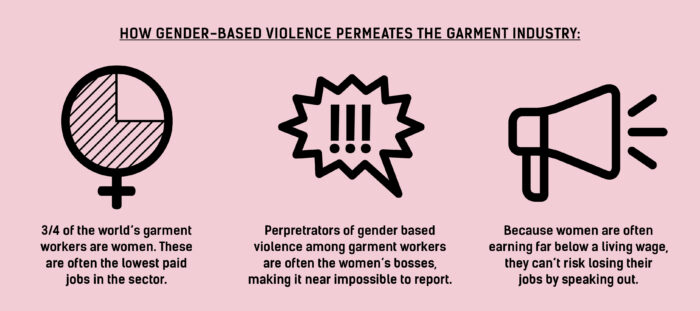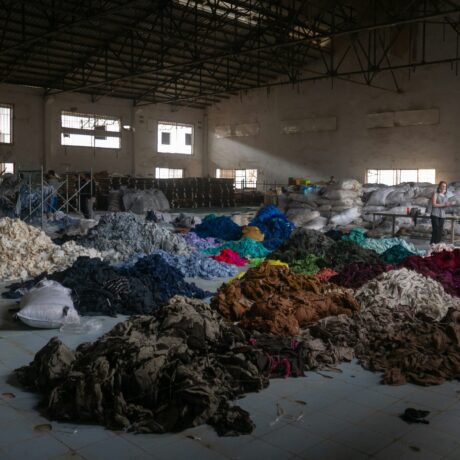16 Days of Action to End Gender Violence at Work
On the International Day for the Elimination of Violence Against Women, the Solidarity Center outlines just how rampant gender based violence is in the garment industry, and how we can fight it.
While sexual harassment and other forms of gender-based violence occur at every workplace, such abuse is rampant in the global garment and textile industry. For instance, among garment workers in Bangladesh, 80 percent report they have experienced some form of violence and harassment on the job. Worldwide, gender-based violence and harassment is one of the most prevalent human rights violations in the world—yet not enough is done to prevent it, especially at work.
Until now.
In June, representatives from employers, government and workers met at the International Labor International Labor Organization (ILO), part of the United Nations, to hash out final details of the treaty that establishes global standards to end gender-based violence and harassment in the world of work. ILO approval of the treaty, called Convention 190 is a monumental first step. But Convention 190 must be ratified by governments to go into effect.
Beginning November 25, International Day for the Elimination of Violence against Women, activists from unions, women’s groups and their allies around the world will take part in 16 days of action to end violence against women at work with a special mission: They will mobilize their members and coalition partners to encourage—and demand—their governments ratify Convention 190 and update or pass national laws ensuring workplaces are free of gender-based violence.
Union women leaders and their allies fought to make Convention 190 a reality, recognizing that it offers the best opportunity for changing structural systems that feed sexual harassment and other forms of gender-based violence in the world of work.
The annual 16 Days of Activism Against Gender-Based Violence is an international campaign coordinated by the Center for Women’s Global Leadership and used by activists around the world as an organizing strategy to call for the elimination of all forms of gender-based violence. (Follow the 16 Days campaign on Twitter at #16DaysCampaign).
This year’s focus on ending GBVH at the workplace builds on 10 years of action by workers and their allies pushing for an international treaty to address gender-based violence and harassment at work. Along the way, workers and their unions built broad coalitions, educated union members and boosted and expanded the collective strength that ensures their voices are heard.
“Convention 190 might sound like a lofty piece of legislation far removed from the struggles of women and vulnerable workers, but in reality it was drafted and fought for by grassroots organizations, unions, and coalitions of mobilized workers from many countries. It reflects their lived experiences,” says Robin Runge, Solidarity Center senior gender specialist.
Convention 190 addresses varied forms of work today and includes all workers, such as formal and informal workers, those under any contractual status, job seekers and trainees, and specifically recognizes women workers. It also defines the world of work: that is, where and how work and work-related activities are performed, including, where workers take a rest break or meal, washing or changing facilities, work-related trips, travel, training, work-related communications, employer-provided accommodations and commuting to and from the job.

Laying the Groundwork for 16 Days of Activism
Workers already are deep into the movement for ratification of ILO 190. In Cambodia and Indonesia, women union leaders laid the groundwork for their campaigns by assessing the extent of GBVH at several factories. In late 2018, they interviewed their co-workers at garment and footwear factories and engaged them in informal focus groups. These unique worker-to-worker discussions found high-levels of gender-based violence on the job.
In Cambodia, where union women engaged with 83 female co-workers, 48 percent of them said they had experienced gender-based violence on the job, with 28 percent stating that someone at work had forced them to sleep with them to extend a contract, fix their sewing machine or to obtain a bonus. Among 105 Indonesian garment workers who took part in interviews and focus groups, women reported managers and other leaders hit them, pulled their hair, groped, touched and kissed them at work and asked for sex. One was even threatened with death.
The process generated much-needed data on the prevalence of GBVH and also served as an awareness-raising mechanism: Many women interviewed were not aware of their rights to a violence-free workplace.
Addressing gender-based violence at work is “important for creating a working environment free from gender-based violence for our [union] members,” says Sumiyati, chairperson for Women and Children’s Affairs at the National Industrial Workers Union Federation (SPN–NIWUF), a Solidarity Center partner. A lawyer by training, she worked for years in the color laboratory of a textile plant, where many women discussed with her incidents of abuse at work.
SPN–NIWUF, in alliance with other Indonesian unions and nongovernmental organizations, are building on the work of the garment union leaders to create material to lobby the government and parliament to ratify Convention 190.
The 16 Days of Activism campaign is a tool in workers’ long struggle to achieve workplaces free of gender-based violence, where all workers are treated with dignity.
“To write a new script for workers, we need to mobilize from the ground up—grassroots worker movements, human rights and women’s rights NGOs, industry voices and corporate foundations,” says Runge. “When we all call on governments and businesses to change, our collective voice becomes impossible to ignore.”








